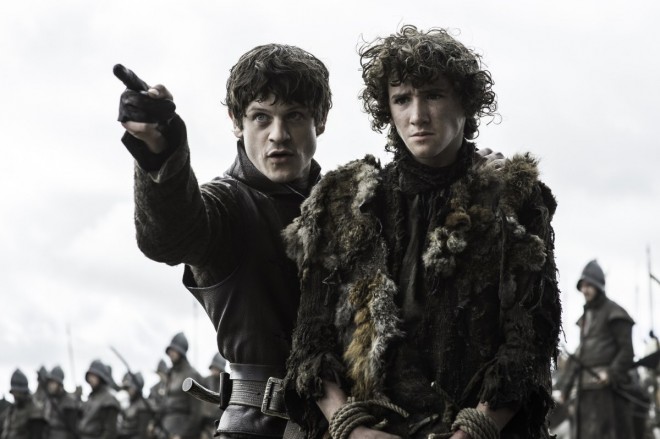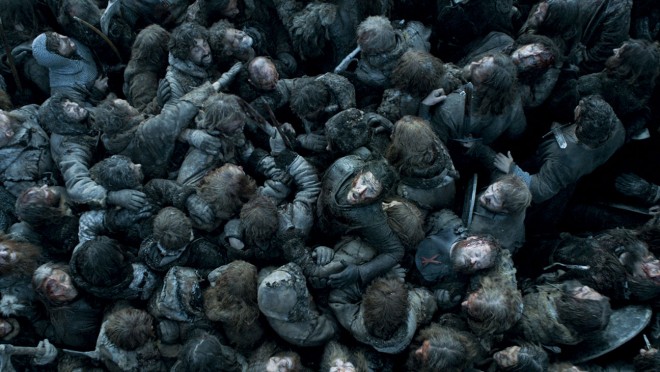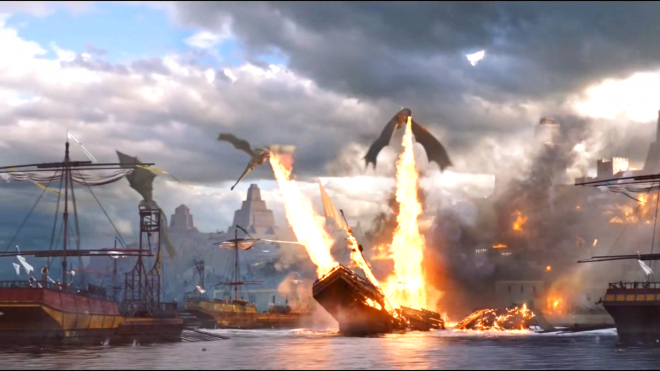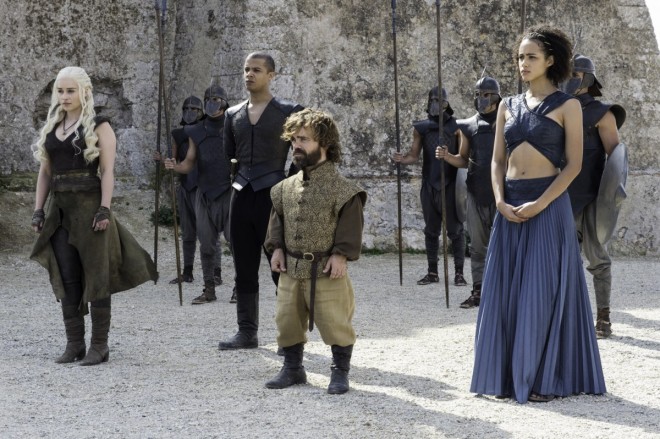‘Game Of Thrones’ Recap: How Loyal Are Your Beasts?
This episode was one of the biggest in 'Game Of Thrones' history.

This is a recap of the latest episode of Game Of Thrones. Spoilers!
–
“My hounds will never harm me,” says a beaten, bound Ramsay Bolton at the end of this week’s episode. “They’re loyal beasts.”
“They were,” replies Sansa. “Now they’re starving.”
This penultimate episode of the season is titled ‘Battle of the Bastards’, and it aired — I can’t resist pointing out — on Father’s Day in the US. This is fitting as, at its heart, it’s all about our responsibility to the vulnerable in our care. Not just hounds… or dragons, or stags, or bears, or direwolves, or any those heraldic beasts on the great house sigils. (Where the fuck, by the way, was Ghost — the only living direwolf to stick by his Stark?) But people, too. Those whose loyalty is bought with love, with security, with liberty, with money, or with fear. All of them fight and die as cattle. “It always seems a little abstract, doesn’t it?” says Tyrion ironically to the Masters. “Other people dying.”
And seeing as I’ve already mentioned the bungled military decisions that led to the horrors of World War I: what are Rickon’s legs? Springs! Steel springs! What are they gunna do? Hurl him across the field! How fast can he run? As fast as a leopard! How fast are ya gunna run? AS FAST AS A LEOPARD!
Of course Ramsay would never let Rickon live, instead using him to lure Jon into a trap. Sansa was right about this (and everything else). Jon’s preference for rash heroism over wise counsel is what makes him a Stark. And until the very last moment, I was hoping somehow Jon could save his little brother. I was even holding out hope of a last-minute Smalljon Umber allegiance switch that never came. Isn’t it odd that I felt his loyalty to the Boltons disgraced the North? I was pleased to see him hacked down by one of the wildlings he feared so much he’d betray his house’s ancestral loyalties.
In battle, both Ser Davos and Tormund prove steadfast lieutenants to Jon Snow. Yet they pause a moment to acknowledge the limitations of their past loyalties — to Stannis Baratheon and Mance Rayder respectively. “You loved that cunt Stannis, and I loved the man he burned,” observes Tormund. “But I was wrong, just like you.”
Nothing hammers this home for Davos than discovering, on his battle-eve stroll, the charred remnants of the pyre on which Princess Shireen was pointlessly sacrificed to the Lord of Light. In the rubble, he finds the broken Baratheon stag he whittled for her: a reminder of how badly he failed the loyal little girl who taught him to read. What follows is the most beautiful shot of this episode as Davos, head bowed over the pyre, is silhouetted against the sunrise.
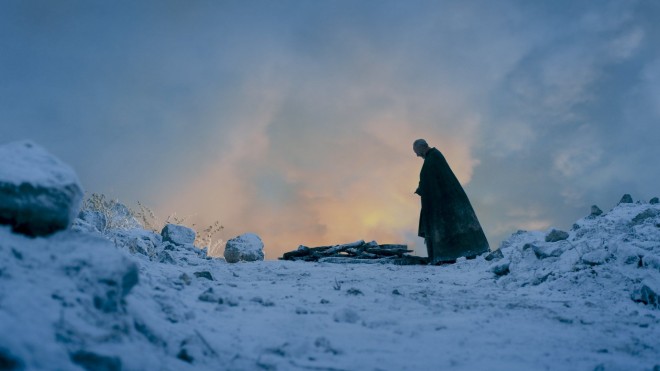
Davos’s Calvary moment.
It felt almost biblical. Ex-smuggler Davos is like the thief crucified alongside Jesus who realises: “We are punished justly, for we are getting what our deeds deserve. But this man has done nothing wrong.” The rising sun is richly symbolic too. Is it the dawn for which they’re all fighting? A new generation rising to power after the sunset of the old? Or perhaps a message that Shireen’s sacrifice did please the Lord of Light after all?
What seems to unite these unlikely allies now is the belief that Jon Snow is a different kind of leader. He’s not a king fighting for political power; nor is he fighting for territory. Jon represents something more primal and his resurrection shows that to his men (although a still-depressed Melisandre warns Jon that perhaps the Lord of Light only preserved him from death to die again on this battlefield). But Jon experiences a second resurrection here as he emerges, gasping just like in episode two, from under the bodies of his own men.
This episode deliberately contrasts the battle for Winterfell with Daenerys Targaryen’s dragonshock and dragonawe in Meereen. Six seasons in, Game of Thrones is inexorably sharpening its focus: winnowing down from its early Wars of the Roses homage to the Song of Ice and Fire that will decide the ultimate Battle for the Dawn.
The Battle of the Bastards will go down as one of this show’s big-budget technical showpieces along with season two’s Battle of the Blackwater, season four’s Battle for the Wall (both directed by Neil Marshall) and last season’s Battle of Hardhome (directed, as was this episode, by Miguel Sapochnik). As this behind-the-scenes video shows, its battle choreography — which included a real cavalry charge of 80 horses — was logistically brilliant.
If you’ve watched any recent medieval war drama — from Henry V to Kingdom of Heaven to Braveheart to Macbeth — you’ll intuitively understand the cinematic grammar of ‘grunge realism’ warfare. Tense standoffs and parleys. Shouting charges with swords aloft. Squealing, rearing, falling horses. The flight paths of arrows. Steadily advancing shield walls. Swordsmen swinging wildly in churned-up mud. Impassive commanders watching ant-like formations from behind battle lines. Dying men with shorn limbs or protruding guts. For extra authenticity, sometimes a spray of mud or blood on the camera lens.
Perhaps because of the wildling factor, this battle felt more like the all-out mayhem seen in Vikings, sliced by moments of weird lucidity. I loved its mood of despair, which was broken — as we always knew it must be — by the Knights of the Vale ex machina. I wanted a little more Daenerys-and-her-dragons-style awe from all involved, considering nobody but Sansa even knew they were coming.
Seeing dragons ridden into battle was both wonderful and terrifying. Dany is now truly a Targaryen like her conquering ancestors. This frightens Tyrion enough that he actually raises with the issue of Mad King Aerys’s old King’s Landing Kaboom strategy with the queen — which, we know from last week, Mad Queen Cersei may be thinking of deploying herself. Peter Dinklage was great here, as Tyrion struggles to justify his caretaker governance while placating his unpredictable boss. Will Daenerys be as loyal to those in her care as her dragons are to her?
She’s no peacetime ruler, but just as Ramsay’s hounds crave flesh, Grey Worm and Missandei are starving for freedom. They’re loyal to Daenerys now because of her anarchic egalitarianism. We saw this again this week as the Masters’ craven choice to sacrifice their “outsider, lowborn” colleague dooms them because it encapsulates their callous elitism.
Game of Thrones has been almost pathetically keen this season to compensate for its previous dodgy treatment of its female characters by showing women being righteous avengers. With this, I’ve often felt like a cat disdainfully regarding a new toy: oh, you think I want this now?
But just as a cat will still deign to play with the toy, I couldn’t help feeling pleased to see Yara and Dany clasp arms as they vow to leave Westeros in a better state than their deadbeat dads did. I also loved Dany’s expression when Yara says of marrying her, “I never demand, but I’m up for anything, really.”
#GameofThrones pic.twitter.com/le2vugX6AH
— Saladin Ahmed (@saladinahmed) June 20, 2016
And then, of course, there’s Sansa’s tiny smile as she walks away from the havoc of the hungry hounds. Appalling to the last moment, Ramsay taunts her that she’ll always bear the scars of his torture. But he will never realise that you can’t win loyalty with cruelty.
–
Game of Thrones is on Showtime at 11am and 7.30pm every Monday.
–
Mel Campbell is a freelance journalist and cultural critic. She blogs on style, history and culture at Footpath Zeitgeist and tweets at @incrediblemelk. Read more of her Game of Thrones recaps here.


